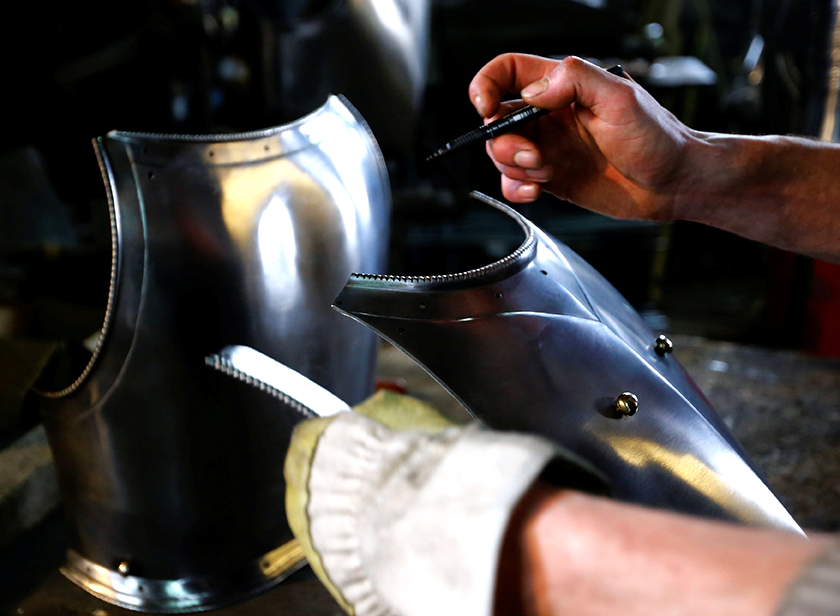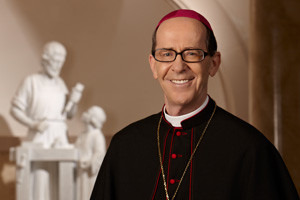
Second in a Series
Throughout the course of human history, wars have been waged and their outcomes have shaped the identity of many nations. But, there is another war, although generally unseen by human eyes, that “is not with flesh and blood but with the principalities, with the powers, with the world rulers of this present darkness, with the evil spirits in the heavens” (Eph 6:12). This spiritual war against the devil and his minions has crucial consequences in our daily life with an outcome that determines our eternal destiny. The devil does all in his power to destroy the work of God in us. We do not have to look far to see his hostility in contemporary society toward truths of the Gospel such as those about sin, heaven, hell and about the need for repentance. This timeless struggle is evident even within the Church herself when some repudiate the teaching of Christ.
Engaged in such a great and dramatic battle for our souls, like the Psalmist, we say: “From where shall come my help? My help shall come from the Lord who made heaven and earth” (Psalm 121). The opening prayer for Ash Wednesday reminds us of this struggle: “Grant, O Lord, that we may begin with holy fasting this campaign of Christian service, so that as we take up battle against spiritual evils, we may be armed with weapons of self-restraint.” Besides the spiritual weapons of prayers, fasting and sacrifice, which others are available to us?
Jesus Christ living and active in the Sacraments

The most effective armor against the lure of the devil’s influence is an intense life of grace that is generously offered through the sacramental life of the Church. In the Sacraments, Jesus Himself fights with us and for us. The Catechism of the Catholic Church defines Sacraments as “efficacious signs of grace, instituted by Christ and entrusted to the Church, by which divine life is dispensed to us” (CCC 1131). This definition conveys essentially the core belief of our Catholic teaching on the Sacraments. To emphasize how Christ continuously manifests His presence in our lives, the early Church Fathers used the term “sacramentum” taken from the Roman military. The “sacramentum” was a solemn oath that soldiers made upon their military enlistment. They bound themselves to defend the empire from any foreign or internal threat. The oath obliged them to go whenever and wherever they were needed to defend the empire.
EN ESPAÑOL: La armadura de los Sacramentos
Jesus also made a solemn promise, just before ascending into heaven, when He told his disciples: “I will be with you always until the end of time” (Mt 28:20). In a distinct way, He fulfills this promise through the Sacraments, especially the Eucharist. So, whenever a Sacrament is celebrated, Christ is there to fight along our side for our salvation. Jesus has established the Sacraments because He knows that we need His presence and grace in our struggle against evil.
The Sacraments, as the Catechism reminds us, “are ‘powers that come forth’ from the Body of Christ, which is ever-living and life-giving. They are actions of the Holy Spirit at work in the Body of Christ, the Church” (CCC 1116). These powers from Christ call to mind some dramatic moments of Jesus’ public ministry, moments such as when He healed the sick and expelled demons from the possessed. The Sacraments have been celebrated for centuries in the Church, however, they do not depend on their antiquity for effectiveness. They are not the actions of ministers who come and go with time, but the actions of the living Christ Himself. We do not speak of Him in the past tense as if He was only a historical figure. On the contrary, we proclaim that “Jesus is risen,” alive and very active in our lives today through the Sacraments. Every Sacrament produces its effects by the power of Christ alone and not by our actions or that of our deacons and priests. For through His death and Resurrection, Christ has been victorious over the forces of darkness and has entrusted to the Church the means to apply this victory to win the spiritual battle for our souls.
The Sacraments, then, are the armor of choice in this spiritual war. Through them, Jesus continues to heal, to forgive, to strengthen and to sustain us in our fight against the devil and his minions.
Sacramental effectiveness and our cooperation
Now we must ask ourselves an important question: Why do so many of us fail to use the full potential of these weapons in our daily spiritual battle against the devil?
The Sacraments have a reality in themselves that is effective and extends the graces they signify. However, the effects of the Sacraments also depend on how well we are disposed to receive them. Christ always gives grace in the sacraments; but we must have the right motives and conditions for receiving those graces. A Sacrament can be validly given and received but still may not be fruitful. Sadly, it is an outcome that seems to be widespread today.
A clear and consistent principle is found throughout the New Testament: namely, no one who encounters Jesus Christ goes away unchanged. The sick went away healed, the blind were able to see, the paralyzed began to walk, the poor had the Good News proclaimed to them, sinners came away with peace and forgiveness, and the dead were raised to life. Sadly, too, there were some who were changed for the worse. The rich young man went away sad when Jesus told him to sell all he had and give it to the poor. The Pharisees and Scribes went away angry at His teachings — so angry that they plotted to kill Him. No one who encounters Jesus remains neutral.
The Sacraments are real encounters with our living Lord; for such encounters to bear abundant spiritual fruit, certain crucial factors must be present, particularly repentance and faith.
Repentance from any attachment to sin is essential to conduct one’s life in harmony with the purpose of the Sacraments, i.e. to increase divine life within us. Therefore, renunciation of sin and the devil is essential for receiving the true spiritual values of the Sacraments.
Encounters with Christ in the Sacraments must also be rooted in faith. Where faith is weak, our encounter with Him is often vague and unfruitful. Where faith is strong and robust, the encounter will bring about a transformation within us. When we participate with sincere faith in prayer and the Sacred Liturgy, the reading of Scripture and the Sacrament of Reconciliation, we do so with greater awareness and expectations of encountering the living God, an encounter that changes us for the better.
As we journey together through the final days of Lent, we look forward to the great battle of the Paschal Mystery, in which Jesus conquers Satan’s pride by His humility and obedience. During Holy Week we will be reminded of the battle that our Lord waged and is still waging in us members of His Mystical Body. May this Season of Lent be a time to free our spiritual life from the evil one. And may the fruits of the great spiritual struggle — sacrifice, prayer, fasting and the witness of our faith — hasten the coming of the Kingdom of God.






